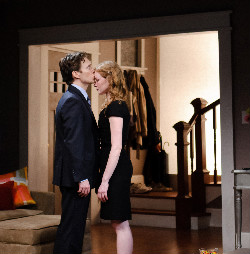Be a Good Little Widow

Chad Hoeppner and Wrenn Schmidt in Be A Good Little Widow. Photo by Ben Arons.
BOTTOM LINE: A well-written, emotionally evocative story examining the divergent generational modes of addressing marriage, grief and mourning.
The generation into which we’re born dictates much of the way we perceive and react to situations. With the enormous impact of technology on everyday life, too, reactions are often filtered through our devices, further distancing how recent generations perceive things, versus their predecessors. Bekah Brunstetter explores this divide through the lens of grief, mourning and widowry in her new play, Be a Good Little Widow, now playing at Ars Nova.
Tucked away in a fresh and cozy domestic residence, child-like bride, Melody (Wrenn Schmidt), spends much of her life in an eager state of waiting for the return of her oft-travelling husband, Craig (Chad Hoeppner). Still learning much about herself and her own ambition, having graduated college only a few years earlier, Melody patiently passes hours consuming reality television. A tragic trip, however, leaves Melody alone and violently thrust from wife to widow. Craig‘s coldly stoic mother, Hope (Jill Eikenberry), member of the Widow’s League, swans in with pointers and guidance, though eventually the small cracks in her sturdy façade begin to buckle. With no normalcy to return to, both women eventually find, through shared solace, new senses of themselves.
The generational interplay within Brunstetter’s script is thoughtful and insightful. Young wife, Melody, and widow and mother, Hope, readily illustrate by contrast the vast shift in expectations regarding domestic life, while also acknowledging that contemporary wives aren’t as far from removed from the shadow of 1950’s pastel domesticity as one might have hoped. Though the rigid, sugar-coated notion of the Betty Crocker housewife seems utterly archaic to the younger generation at this point, the storm cloud of parental expectation in such matters continues to loom large for many; Brunstetter has perfectly presented this struggle. With grief and mourning then added to the mix, the discussion quickly veers into the dangerous territory of not merely what is acceptable in caring for a husband, but now how to qualify love that no longer has potential for longevity. Melody’s need to qualify and defend her love for her deceased husband is as unfair as it is crushing, and though she eventually finds calm in her relationship with her mother-in-law, the remnants of her fragility linger on.
This same fragility and searching is matched by Meldody's young, male counterpart Brad (Jonny Orsini), Craig’s assistant. Their awkward, yearning, twenty-something dialogue is simultaneously comfortable and heartbreaking: the easy banter of two who speak the same language is also the frivolous chatter of two aimless, aging youths. Their beautifully scripted attraction to one another’s self-consciousness and stunted development poignantly captures the young-person’s repartee du jour, giddy and anxious as an expectant text-message exchange.
Brunstetter’s very personal play abounds with sumptuous moments of palpable awkwardness. Paired with Stephen Brackett’s highly naturalistic direction of the talented ensemble cast (supported well by Daniel Zimmerman’s set, Jessica Pabst’s costumes and Burke Brown’s lights), these moments are consummately voyeuristic, ringing true in their tender discomfort. But above all, it is Brunstetter's honest and touching script that leaves few eyes dry either on stage or amongst the audience.
(Be a Good Little Widow plays at Ars Nova, 511 West 54th Street between at 10th Avenue, through May 14th. Performances are Tuesdays at 8PM, Wednesdays at 8PM, Thursdays at 8PM, Fridays at 8PM and Saturdays at 8PM. Tickets are $30 and are available at arsnovanyc.com or by calling 212.352.3101.)

